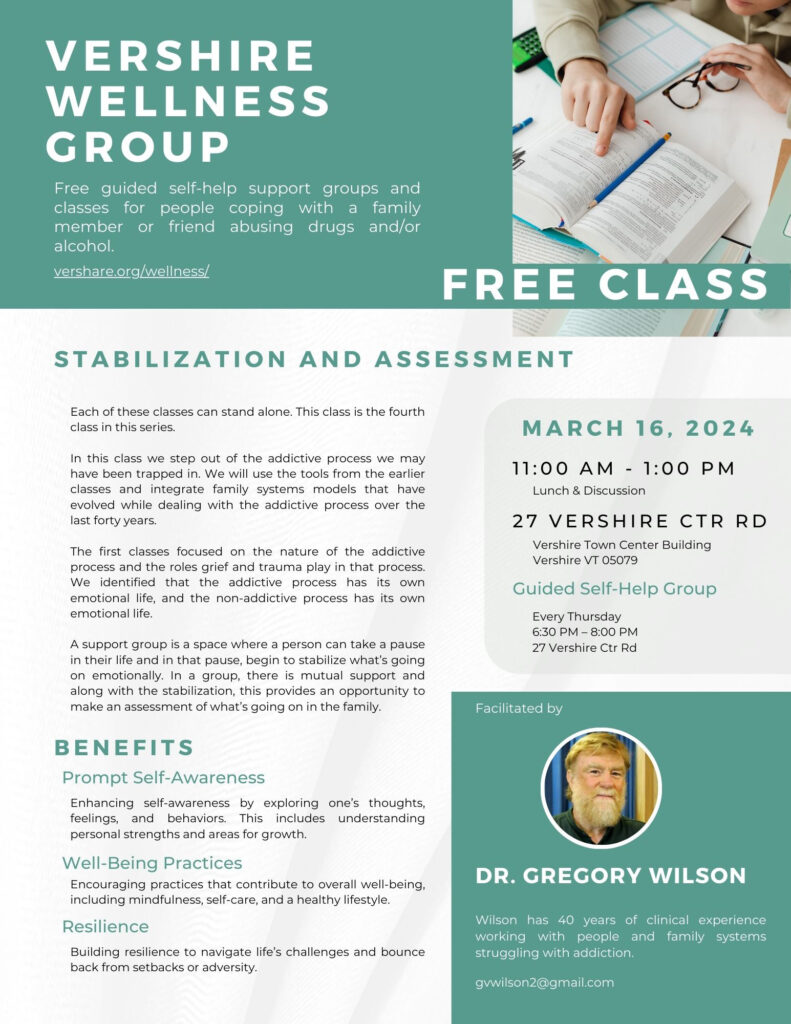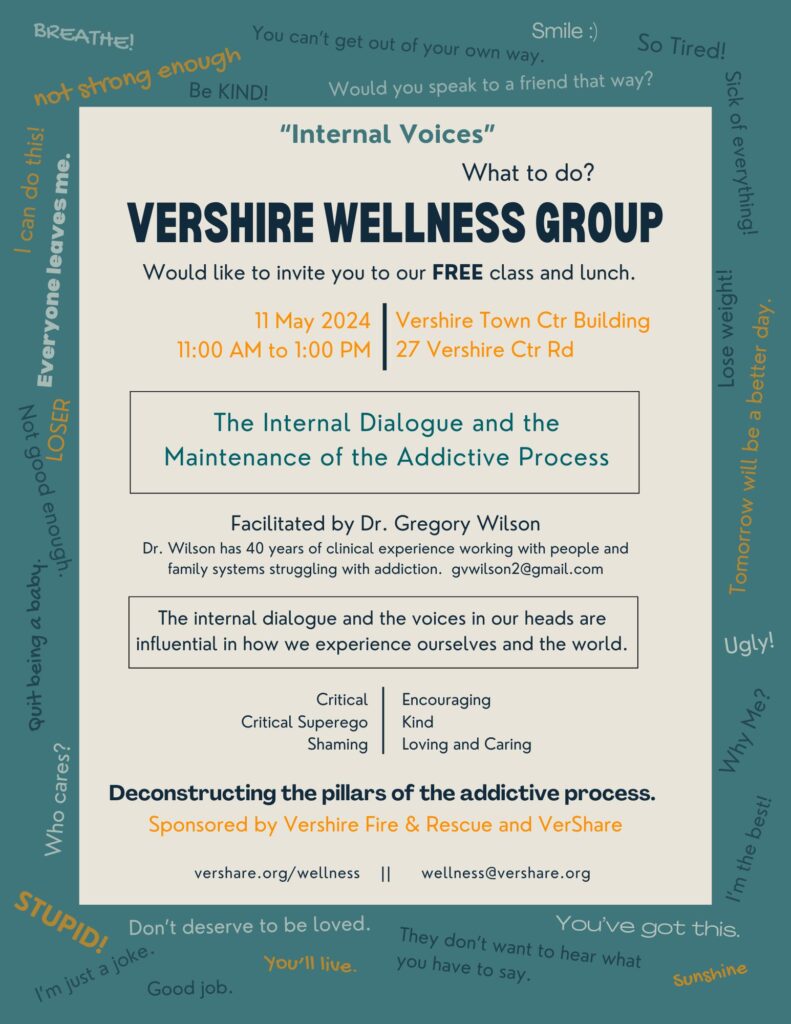Vershire Wellness Group
The Vershire Wellness Group offers free guided self-help support groups for people coping with a family member/friend abusing drugs and/or alcohol. Please join us for any or all of the following groups or classes which are free and open to all.
The Vershire Wellness Group is led by Dr. Gregory Wilson, who has over 40 years of clinical experience working with people and family systems struggling with addiction.
A guided self-help support group is a group that provides a structured and supportive environment for individuals who are seeking personal development or dealing with specific challenges. Unlike traditional support groups where participants share their experiences and insights, guided self-help groups typically follow a structured program or curriculum.
These groups are open to all, have no cost, and have a clear agenda of moving from an addictive process to a non-addictive process.
Wellness Offerings:
Guided self-help Group
Every Thursday
6:30 PM – 8:00 PM
Vershire Town Center Building, 27 Vershire Center Rd. Vershire VT 05079
A member of the Vershire Wellness Group will facilitate the topic.
Any questions, email us. wellness@vershare.org
Free Class For Families with Loved One in Trouble with Addition
August 10, 2024
10:30 AM – 12:30 PM
First Congregational Church in Thetford, 2596 VT Rte 113, Thetford Ctr. VT 05075
Addiction impacts everyone—individuals, families, and communities. Understanding the patterns of responses to the one using is one of the first steps. This is an introductory class to navigating the emotional life of trauma and loss — families struggling in the addictive process.
Event flyer is below.

Group
A guided self-help support group is a group that provides a structured and supportive environment for individuals who are seeking personal development or dealing with specific challenges. Unlike traditional support groups where participants share their experiences and insights, guided self-help groups typically follow a structured program or curriculum.
In a guided self-help support group:
- Structure
- The group sessions follow a predefined structure or curriculum designed to address specific issues or goals. This structure can include topics, activities, or exercises that participants work through..
- Guidance
- A facilitator or leader guides the group through the program, providing information, instructions, and support. This guidance can come in the form of discussions, presentations, or interactive activities.
- Self-Help Aspect
- Participants are encouraged to actively engage in their own self-help journey. This may involve setting personal goals, completing assignments, or practicing skills discussed in the group.
- Peer Support
- While there is guidance from a facilitator, the group also emphasizes peer support. Participants share their experiences, challenges, and successes with each other, creating a sense of community and understanding.
Education
Psychosocial education refers to a form of education that focuses on the psychological, relational, and social aspects of families struggling with addiction. It encompasses a wide range of topics aimed at enhancing individuals’ understanding and skills related to their mental health, relationships, emotions, and overall psychological functioning. Psychosocial education often seeks to promote self-awareness, interpersonal skills, resilience, and a positive sense of mental and emotional well-being.
Key components of psychosocial education may include:
- Emotional Intelligence
- Understanding and managing one’s own emotions, as well as recognizing and empathizing with the emotions of others.
- Communication Skills
- Developing effective communication skills, including active listening, assertiveness, and conflict resolution.
- Stress Management
- Learning techniques to cope with stress, anxiety, and other challenges in a healthy and constructive manner.
- Relationship Building
- Exploring topics related to building and maintaining healthy relationships, including family dynamics, friendships, and romantic relationships.
- Self-Awareness
- Enhancing self-awareness by exploring one’s thoughts, feelings, and behaviors. This includes understanding personal strengths and areas for growth.
- Resilience
- Building resilience to navigate life’s challenges and bounce back from setbacks or adversity.
- Mental Health Awareness
- Increasing awareness and reducing stigma surrounding mental health issues. This may include understanding common mental health conditions and seeking help when needed.
- Problem-Solving Skills
- Developing critical thinking and problem-solving skills to approach challenges in a systematic and effective way.
- Life Skills
- Acquiring practical life skills such as time management, decision-making, goal setting, and financial literacy.
- Coping Mechanisms
- Exploring healthy coping mechanisms and strategies to manage difficult emotions and situations.
- Cultural Competence
- Promoting an understanding of cultural diversity and competence in interacting with individuals from different cultural backgrounds.
- Well-Being Practices
- Encouraging practices that contribute to overall well-being, including mindfulness, self-care, and a healthy lifestyle.
Training
In any training process, it is helpful to know the objective of the training and the meaning of the skill you are learning. The deep wounding of families in the addictive process creates terribly difficult seas to navigate. Hope, no hope, dreams lost, financial hardship, families breaking up, unending grief and anxiety, children lost in the middle, sudden grief, pressure on other family members – all this and more comprise the emotional field for which training must prepare one. It is now clear this emotional field affects millions of families and is increasing. Present models and efforts struggle to meet the needs of these families. A void of care has been identified. People are suffering and asking for help. The nature of this emotional field is a good reason to pause and breathe deeply. Ask yourself, “What is it we are up to, training to pull people from these rough seas?” The goal of this training is to build a local response to this sea of complex relational and societal toxic outcomes.
The training of facilitators will include the following areas:
- Understanding Addiction from a family perspective
- Understand the nature of addiction that includes the family.
- The addictive life has an emotional field and range as does the non-addictive life.
- Communication Skills
- Effective communication strategies, emphasize active listening, empathy, and non-judgmental responses.
- Setting boundaries and maintaining them while still offering support.
- Understanding the Emotional Field
- Delve into the intricate emotions experienced by families affected by addiction, recognizing the profound impact on individual members and the family unit as a whole.
- Explore the layers of grief, anxiety, financial hardships, and relational challenges that define this emotional landscape.
- Family Systems and Triangles
- Introduce the concept of family systems theory, emphasizing the role of interconnected relationships within the family.
- Utilize the lens of triangles as a foundational framework for understanding the dynamics of family systems, exploring how relationships and roles evolve over time.
- Personal Reflection and Storytelling
- Encourage participants to trace a triangle from their personal stories, examining the emotional life of that triangle to date.
- Facilitate opportunities for storytelling and reflection, allowing participants to explore their experiences, challenges, and insights within a supportive environment.
- Journaling and Reflective Practice
- Incorporate journaling as a therapeutic tool throughout the training process, encouraging participants to document their thoughts, feelings, and observations.
- Emphasize the importance of reflective practice, fostering self-awareness, growth, and continuous learning among participants.
- Understanding Addiction from a family perspective
- Understand the nature of addiction that includes the family.
- The addictive life has an emotional field and range as does the non-addictive life.
- Communication Skills
- Effective communication strategies, emphasize active listening, empathy, and non-judgmental responses.
- Setting boundaries and maintaining them while still offering support.
- Understanding the Emotional Field
- Delve into the intricate emotions experienced by families affected by addiction, recognizing the profound impact on individual members and the family unit as a whole.
- Explore the layers of grief, anxiety, financial hardships, and relational challenges that define this emotional landscape.
- Family Systems and Triangles
- Introduce the concept of family systems theory, emphasizing the role of interconnected relationships within the family.
- Utilize the lens of triangles as a foundational framework for understanding the dynamics of family systems, exploring how relationships and roles evolve over time.
- Personal Reflection and Storytelling
- Encourage participants to trace a triangle from their personal stories, examining the emotional life of that triangle to date.
- Facilitate opportunities for storytelling and reflection, allowing participants to explore their experiences, challenges, and insights within a supportive environment.
- Journaling and Reflective Practice
- Incorporate journaling as a therapeutic tool throughout the training process, encouraging participants to document their thoughts, feelings, and observations.
- Emphasize the importance of reflective practice, fostering self-awareness, growth, and continuous learning among participants.


